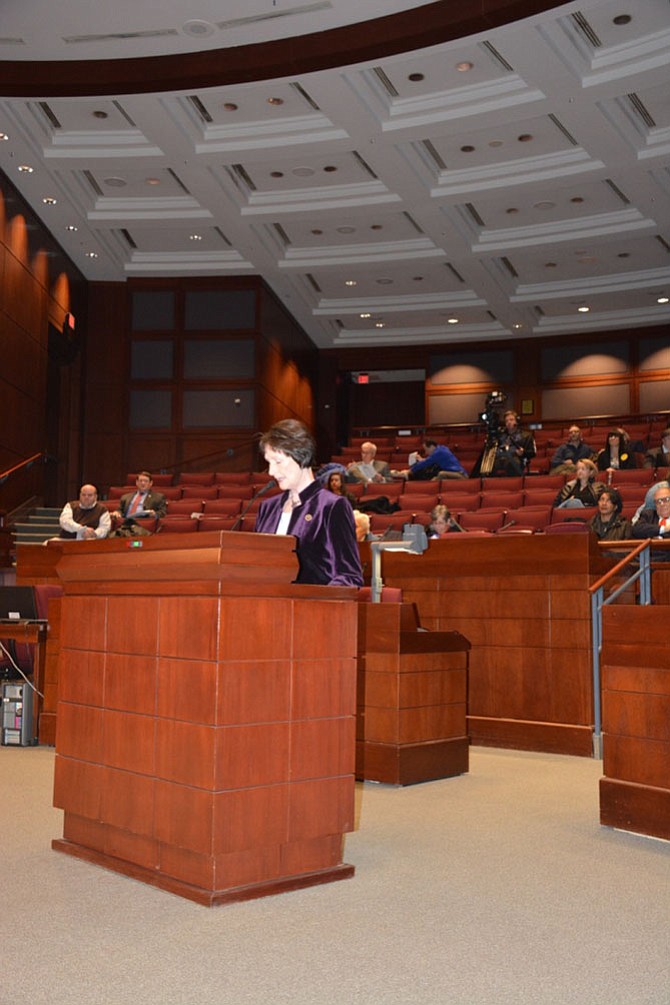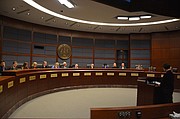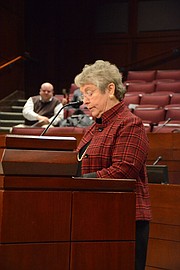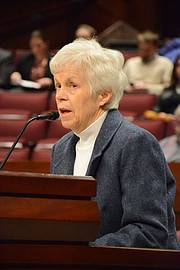Education was once again an important topic for many speakers at the Jan. 7 public hearing for the Fairfax delegation to the General Assembly, beginning with Board of Supervisors chairman Sharon Bulova. Photo by Tim Peterson.
Robert Sledzaus of Reston asked the delegation to consider a “litmus test” for legislation in their session: “Does it serve homeowners’ rights or special interest groups” such as homeowners associations.
Melanie Meren of Vienna spoke on behalf of the public schools group #IamFCPS. First, she said, “We want the broken county and state budget process fixed.” Increased class sizes threaten the excellent education available in Fairfax County, said Meren. She encouraged the state leaders to “be creative” in “getting tax dollars back here.”
Louise Epstein of McLean said she’s worried that future FCPS superintendents may use class size as a tool to continue balancing the budget. “Please patron the bill requiring schools to publicize class size data,” she said.
Rikki Epstein of Reston is executive director of the Arc of Northern Virginia. Epstein said there “simply isn’t room for more cuts” when it comes to the more than 4,000 Virginians with disabilities on the waitlist for disability services waivers that would allow them to receive services to live independently in the community.
Marta Conner of Clifton spoke on behalf of her daughter Caroline, whose syndrome caused her to have 98 seizures last year. An Elderly or Disabled with Consumer Direction (EDCD) waiver helps the Conner family with nursing costs. Conner urged the legislators to reject what she said was Gov. Terry McAuliffe’s (D) proposal to reduce money to the waiver system. “You have the power to improve or even save our lives,” Conner said.
Frank Stephens of Fairfax said it was his job to “put a face” on the request by several speakers that lawmakers vote against cuts to disability services waiver slots. “In my case, an unusually handsome face,” Stephens said. “These services really do make a difference.”
Sarah Pickford of Springfield spoke on behalf of the Springfield-based non-profit Brain Injury Services. Pickford urged lawmakers to oppose proposed cuts to state funding for the organization.
Maya Simbulan of Fairfax is in tenth grade and is living with the effects of a traumatic brain injury. She has limited use of her right hand and her memory is disabled, she said. “Brain Injury Services gave me support and confidence to become the person I am today,” said Simbulan. “I want to continue to become part of the community and a successful person.”
Brooke Annessa of Fairfax is a case manager for Brain Injury Services and the mother of a daughter with a brain injury. The services the nonprofit provides, Annessa said, “provide a little bit of hope, comfort” for individuals like her daughter and their parents and families. “Please consider restoring funding” to BIS,” she said.
Andy Ludwig of Falls Church said there were three groups of people with diseases or physical issues that all share the fact that “marijuana has been shown to provide therapeutic pain relief,” yet the drug is still prohibited in the Commonwealth of Virginia. “Ninety percent of Virginians support it,” Ludwig said. “There’s no public policy we’re getting more completely wrong.”
Duane Ludwig of Falls Church followed his brother and also spoke to the delegation about legalizing marijuana. He said marijuana-related arrests were breaking up families and a large, unnecessary cost to taxpayers to continue enforcing prohibition laws, and prosecuting and incarcerating offenders.
Richard Kennedy of Lorton encouraged the delegation to consider making marijuana use legal by looking to “unbiased sources and watching others that that have legislation.” In the case of teenage drug use, Kennedy said, “regulation works better than prohibition.”
Barry Weinstein of Alexandria represented the Fairfax County Federation of Teachers on Jan. 7. He said there would have to be a “dramatic change” in teacher salaries in Fairfax County “to attract and retain quality teachers.” “The state must share responsibility with the local school board,” he said. Weinstein also asked that the Virginia Retirement System date be returned to its original statutory timeline.
Gary Ambrose of Vienna, chair of the Fairfax-Falls Church Community Services Board, said individuals with disabilities need more state funding for services. He referenced an online suicide prevention program.
Diane Tuininga of Fairfax spoke on behalf of the Fairfax-Falls Church Community Services Board. Tuininga said the increase in CSB services for individuals with mental or physical disabilities such as Diversion First and Crisis Intervention Team training is hastening recovery and saving lives.
Michele Menapace of Alexandria is a board member for the Fairfax County Community Action Advisory Board, which makes recommendations to the county about programs and resources for low-income families and individuals.
Morgan Jamison of Oakton is a board member for the Fairfax County Community Action Advisory Board, which makes recommendations to the county about programs and resources for low-income families and individuals. “Affordable housing is a particular need,” she said.
Robert Stewart of Chantilly, representing Vienna-based Social Action Linking Together (SALT), addressed the General Assembly delegation regarding Medicaid and the Temporary Assistance for Needy Families (TANF) block grants.
Bruce Neilson of Fairfax, representing Vienna-based Social Action Linking Together (SALT), advocated for putting unspent Temporary Assistance for Needy Families (TANF) block grant money to good use.
Anna Jullien of Fairfax spoke out against gerrymandering. One-hundred twenty-two incumbents were re-elected in a recent election, she said. “That’s not much incentive to get out and vote,” said Jullien. Advocating for non-political redistricting reform would provide “a real shot at legitimate accountability to voters,” she said.
Paul McClemens of Reston is the president of the Fairfax County Federation of Teachers. “We’re worse off now than in 2013, the ‘year of the teacher,’” he said. “Teacher salaries have barely increased since 2008.”
Carol Jameson of Vienna represented HealthWorks for Northern Virginia, a nonprofit providing primary care services in Fairfax County that “help make and keep our community healthy.”
Arthur Purves of Vienna spoke in opposition to the concept of co-ed bathrooms, saying they “make the world dangerous for women.” “To erode moral standards,” Purves said, “I think we’ve seen it already happening.”
Calvin Rizek of Fairfax is a student at Virginia Tech and spoke on behalf of the group Decoding Dyslexia Virginia. “My own school didn’t teach me how to read,” he said. “I worry about other dyslexic students who give up, who aren’t diagnosed until later.” Rizek encouraged the delegates to support HB842 that would impact teacher preparation and licensure with regards to dyslexia and other learning disabilities.
Meg Gorham of Alexandria spoke on behalf of the group Decoding Dyslexia Virginia. “Each teacher, year after year,” she said failed to diagnose her daughter with the learning disability dyslexia. After getting private testing, she said her daughter’s school was eager to help “but no one knew how.” Gorham encouraged the delegates to support SB759 that calls for advanced special identification of students with dyslexia. “It shouldn’t be this hard for students to get what they need,” she said.
Al Francese of Clifton spoke on behalf of the group Centreville Citizens for Rail. “What is our vision for I66?” he asked. Francese called for enhancing existing congestion control on the major roadway, as well as increased provisions for carpooling, telecommuting and bus transit along the corridor.
Richard Gray of Oakton is the president of the Fairfax Bar Association. Gray advocated for “adequate judicial funding for our courts” to protect existing judgeships. He said the impact of lack of funding in courts is causing an “unconscionable” delay in case scheduling that affects families.
Elanna Weinstein of Herndon represented the Fairfax Bar Association, advocating against eliminating the 15th seat on the Fairfax County Circuit Court.
Joseph Dailey of McLean represented the Fairfax Bar Association on Jan. 7. He said lack of funding for the court system in Fairfax County is putting unnecessary pressure on dockets and causing delays. “It’s not justice, it’s not access to justice,” he said.
Kimberly Adams of Clifton is president of the Fairfax County Council of PTAs. She advocated for lower class size, competitive teacher salaries and “innovative student programs,” all of which require helping the public school system overcome a projected budget shortfall. “We’re facing issues providing a high quality education, regardless of zip code,” Adams said. “The current funding reality is not enough, it’s not sustainable.”
Holly Seibold of Vienna is founder and executive director of the group Bringing Resources to Aid Women’s Shelters that provides donated feminine hygiene products to women in need or who have insufficient access to them. She urged the delegation to support the “Dignity Act,” introduced by Del. Jennifer Boysko (D-86), that would make toilet paper, adult diapers and some feminine hygiene products tax exempt.
Michael Ducharme of Burke said he’s lived with the learning disability dyslexia himself and now has two daughters who have been diagnosed. He said he’s seen the “same lack of support in public schools my parents faced.”
Teresa Elder of Springfield encouraged the delegates to support SB1027, which provides for pharmaceutical production of cannabis oil. She praised Sen. Dave Marsden (D-37), who she said went out of his way to better understand the situation of her son’s intractable epilepsy. “I encourage you to be open to hearing our voices, reasons for supporting this bill.”
Teresa Champion of Springfield represented the Virginia Autism Project. Champion called for restoring the Medicaid waiver system and advocated for an advisory council to establish standards for treatment.
Cat Clark of Alexandria represented Showing Up for Racial Justice Northern Virginia and spoke about the in-custody death of African American inmate Natasha McKenna who was tasered several times by Sheriff’s deputies while they attempted to restrain and transport her. The Fairfax County Police Department and Sheriff’s Office “both must be complicit in Natasha McKenna’s death,” Clark said. Clark also called the recent creation of a full time police auditor and civilian review panel “smoke and mirrors.” She criticized the Virginia law that prevents citizens boards from being granted authority to independently investigate police.
Cayce Utley of Centreville demanded a change in Virginia law to allow for civilian groups to be able to independently investigate police. She called for asking “zealously for justice, for all marginalized people.”
Catharine Trauernicht of McLean asked if the delegates would commit to mandating an audit of the Virginia Office of Newcomer Services for refugees and if they would commit to arranging a public forum explaining how the resettling process works. No delegate raised a hand for either, which Sen. Dick Saslaw (D-35) said was because that would signify voting for a measure they hadn’t had time to fully consider.
Holly Seibold of Vienna, founder and executive director of the group Bringing Resources to Aid Women’s Shelters, speaks with Del. Mark Sickles (D-43) during the Jan. 7 public hearing for the Fairfax Delegation to the Virginia General Assembly.
Mary Elizabeth Weitzmann of Reston represented the group Va Norml and advocated for the legalization, regulation and taxation of marijuana. “Couldn’t we use the money?” she asked. “It could be used for positive change in Fairfax County. And there are lives, mostly young, that are ruined for illegally possessing and growing cannabis.”
Warren Wheeler of Springfield represented the Convention of States Project. He advocated for HJ547, which would have Congress call a convention of the states to propose amendments to the U.S. Constitution to restrain the federal government from abusing power.
Meg Kilgannon of Centreville spoke in support of HB1612, which would require public schools to notify parents if their son or daughter identified in school as a gender that’s different from that of their birth. “It’s simply notifying,” Kilgannon said, “common sense. It isn’t something onerous. It’s information parents have a right to and should be given.”
Kirsten Wittkowski of Oakton represented the Centreville Commission for Labor Justice. “The courts, legislature, enforcement agencies are not doing enough” to combat illegal wage theft,” she said. “Our community is counting on you.”
Kevin Hickerson of Centreville is president of the Fairfax Education Association. Other than another looming budget crisis, Hickerson drew attention to reforming the Virginia Standards of Learning tests, limiting standardized tests, fairness in dismissal process and making stronger investments in students.
John Murray of Burke represented the organization ParentandChild.org. He spoke about what he believed to be some of the pros, cons and problems with the current Fairfax County Public Schools Family Life Education curriculum, saying that some FLE lessons “condone risky sexual practices.” “Parents expect the curriculum to reduce these diseases -- FLE has an unacceptably high degree of errors which parents in Fairfax County are powerless to challenge.”
Vivian Perea of Alexandria represented NoVa NORML and was pushing for legalization of marijuana for medical use. She said he’s been prescribed opioids for the extreme pain associated with her disease. “I don’t want opioids, I want a cure, and I found it in cannabis,” she said.
Tim Thompson of Vienna is president of the Fairfax County Federation of Citizen Associations and along with several other members introduced the main points of that group’s legislative package for 2017.
Duke Dunn of Springfield represented the group Saving Our Society-Pulling All Communities Together and pushed for the legalization of medical marijuana. “It’s about wellness, it’s an herb, it’s natural,” he said. “You need to endorse it and help the people. It’s the will of the people, do it now.”
Duke Dunn of Springfield handed out some informative pamphlets on the health benefits of cannabis to delegates during the Jan. 7 Public Hearing for the Fairfax Delegation to the General Assembly.
“We’re not letting teachers do their jobs,” was the plea from Jo Neuber of Vienna, Co-chair of the organization Class Size Counts. Neuber thanked Del. Jim Lemunyon (R-67) for developing three class size bills for the 2017 session of the Virginia General Assembly, including HB1498. Neuber said she was in favor of putting a cap of 24 students in science labs.
Neuber was one of more than 80 Fairfax County residents who spoke directly to members of the Fairfax delegation to the General Assembly at a public hearing on Jan. 7 at the Fairfax County Government Center.
The General Assembly is set to convene in Richmond at noon on Jan. 11, when they will begin work on new or amended legislation for the Virginia Code.
The public hearing was the last chance local constituents had to voice their hopes or concerns for pending or potential legislation in person without traveling to the state capital, though most lawmakers have already all but finalized their legislative agenda for the session.
Education was once again an important topic for many speakers, beginning with Board of Supervisors chairman Sharon Bulova.
“Of the $21 million in additional state funding the county was expected to receive in FY2017, $4.4 of that is already at risk due to the cancellation of funding for raises for teachers and other instructions personnel,” Bulova said. “We must get that funding back and we must make sure that funding for those raises is included in the FY2018 budget.”
Bulova and Fairfax County Public School Board vice chair Jane Strauss said the Virginia Retirement System rates were accelerated by one year last year, which increases the costs for FCPS by more than $25 million in FY 2017.
“We ask for help in avoiding funding reductions to our local programs and services,” Bulova said, “and opposing restrictions on our local revenues.”
Several education advocates echoed Neuber’s call to reduce class size, and Bulova’s concern for competitive teacher salary levels.
Other topics with numerous speakers included legalization of marijuana for medicinal use; funding for disability services waivers; transportation and congestion reduction; funding for the court system; and the tax on toilet paper, adult diapers and some feminine hygiene products.
Holly Seibold of Vienna is founder and executive director of the group Bringing Resources to Aid Women’s Shelters that provides donated feminine hygiene products to who have insufficient access to them. She urged the delegation to support the “Dignity Act,” introduced by Del. Jennifer Boysko (D-86), that would make toilet paper, adult diapers and some feminine hygiene products tax exempt.
For more information on the General Assembly, to track a bill or find out who your representative to the assembly is, visit virginiageneralassembly.gov.
More like this story
- Residents List Priorities for General Assembly
- General Assembly Fairfax Delegation Holds Public Meeting Prior to Session in Richmond.
- Parents Plead for Delay in Training Center Closing
- Fairfax Station: First Decoding Dyslexia 5K Held at Burke Lake
- Northern Virginia Training Center in Fairfax to Close by March 2016



